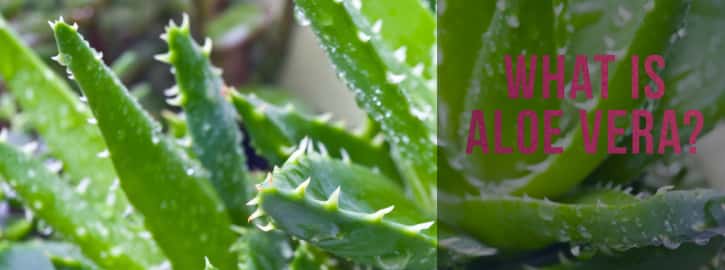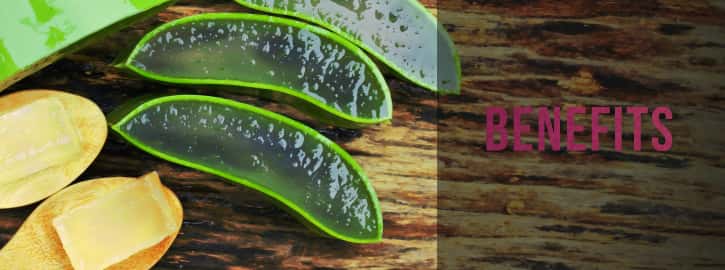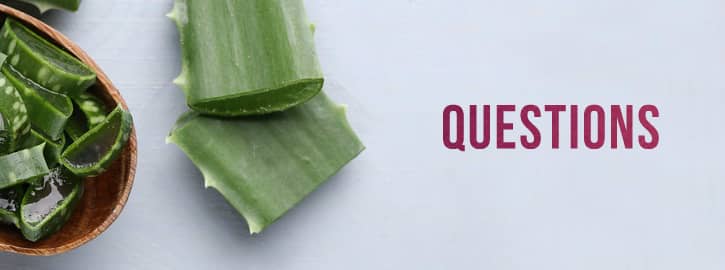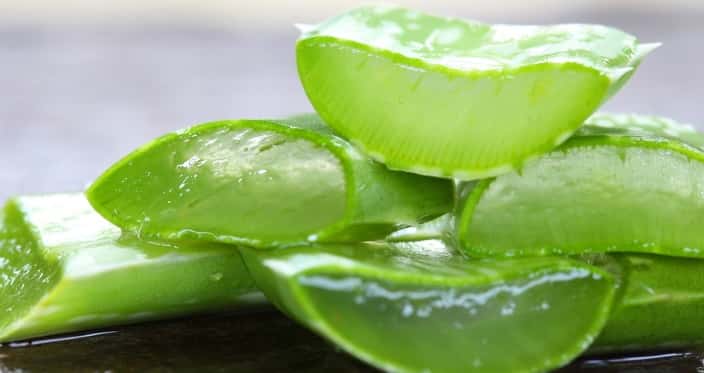Aloe vera has a long tradition of use.
In fact, it’s among the oldest natural health and beauty treatments in recorded history.
It was hailed as the ‘plant of immortality’ by the ancient Egyptians.
Where it was used by the celebrated queens Nefertiti and Cleopatra to maintain their famous beauty.
And the ancient Greeks and Romans employed it for uses as diverse as treating hair loss and healing the wounds of soldiers after battle.
The popularity of its use has continued through to modern times.
It’s regularly used for its ability to soothe and moisturize the skin. And it’s a popular salve for a range of skin disorders.
In this article, we’ll take a deeper look at the benefits of Aloe vera for skin.
What Is Aloe Vera?

First, let’s take a look at what it is.
Also known as Aloe barbadensis miller, Aloe vera is a small perennial shrub with thick, triangular, and fleshy green leaves.
It’s prized for its healthy healing properties.
And the extraction of the juice and gel from its leaves is amongst the largest botanical industries on the planet.
The gel is most commonly used for skincare, and contains a huge number of potentially bioactive compounds.
Is Aloe Vera Good For Your Skin?
Scientific research into the use of Aloe vera has produced some positive results.
Mostly in support of its moisturizing, protective, and healing properties.
However, the evidence is not always strong enough to be conclusive.
Undoubtedly, there’s a need for larger controlled trials, so we can fully evaluate its effectiveness.
This means that a lot of the evidence to support its use is anecdotal.
And Aloe vera remains very popular with natural health and beauty enthusiasts for its perceived benefits for skin.
Let’s take a look at these benefits in detail.
Benefits Of Aloe Vera For Skin

Moisturizing
Aloe vera is well known for its ability to moisturize the skin.
It contains mucopolysaccharides, which are thought to aid skin hydration by acting as humectants. They attract and bind moisture, preventing its loss.
One scientific study looked at the effect on skin hydration of different concentrations of Aloe vera extract. It found that it had a positive effect on the water content of the surface layer (1).
One of the great things is that it doesn’t leave a greasy finish to your skin.
And in contrast to some of the popular facial oils, it won’t block your skin pores. So you can worry less about it causing breakouts.
This makes it good for people with dry skin, and those with oily skin.
Anti-aging
Moisturization will improve the appearance of your skin.
But Aloe vera could also have exciting anti-aging benefits. Helping you to look more youthful as you age.
The secret lies in the antioxidants it contains. It’s rich in vitamins C and E, beta-carotene, and phenolic compounds.
These can neutralize free radicals, created in the skin after exposure to UV light.
The damage caused by free radicals can affect the structural proteins of the skin, producing lines and wrinkles.
Also, applying Aloe vera to your skin results in the creation of an antioxidant protein called metallothionein.
This protein helps to protect against UV radiation by scavenging free radicals.
And it helps the activity of superoxide dismutase and glutathione peroxidase. Two important enzymes in the skin that protect against oxidative damage.
And it doesn’t stop there.
It also increases the production of collagen and elastin.
This could help to increase the elasticity of the skin. Reducing the appearance of wrinkles.
Acne
As a natural treatment for acne and pimples, Aloe vera appears to have a lot going for it.
Some of its constituents can kill harmful bacteria on the skin.
And it contains compounds that have an anti-inflammatory effect. Making it useful for treating an inflammatory condition like acne.
There’s also a huge number of successful anecdotal reports.
But unfortunately, we still await clinical trials that can demonstrate exactly how effective it is.
Skin Conditions
Its anti-inflammatory properties aren’t just useful for acne.
Anecdotal evidence has long suggested the use of Aloe vera for the treatment of skin problems such as eczema, dermatitis, and psoriasis.
And although larger clinical studies are needed to gain conclusive data, there is scientific evidence to support its use.
With recent small studies showing effectiveness at treating both psoriasis and seborrheic dermatitis (2, 3).
Sunburn
One of the most common uses of Aloe vera is to soothe sunburn.
With its ability to hydrate the skin and relieve inflammation, it can reduce the itchiness and stinging that develop after excessive sun exposure.
In one study that looked at the ability of Aloe vera gel to reduce UV induced redness of the skin, a significant improvement was seen compared to a control group that used a placebo gel (4).
This supports its use in aftersun lotions and as a simple home remedy.
Anti-fungal
Aloe vera extract contains a number of known antiseptic agents that can inhibit the growth of fungi.
These include salicylic acid, lupeol, cinnamonic acid, urea nitrogen, sulfur, and polyphenols.
This could make it useful for treating harmful fungi that infect the skin. For example, salicylic acid is known to inhibit Candida albicans.
Wounds & Burns
One of the traditional uses of Aloe vera to aid the healing process.
And this has attracted a lot of scientific attention.
A number of studies on both animals and people have returned encouraging results when looking at wounds and burns.
Aloe contains a polysaccharide called glucomannan and a growth hormone called gibberellin.
These interact with fibroblasts in the skin to increase collagen production and cross-linking.
And an increased synthesis of dermatan sulfate and hyaluronic acid can be seen at the wound site after topical application.
This helps to accelerate wound contraction and the rate at which it heals.
The results are promising. And the evidence suggests it could help you to add some Aloe vera gel to any cuts, scratches, or minor burns you pick up.
But more research will be required to confirm its wound healing potential.
Razor Burn
Shaving your skin can literally be a pain.
It can leave your skin feeling dry, sore, and itchy.
Not to mention, unsightly razor bumps.
Fortunately, the soothing anti-inflammatory properties of Aloe vera make it a great aftershave lotion. Or a key ingredient in a homemade shaving gel.
It moisturizes the skin and relieves the itching. Leaving your skin feeling soft, smooth, and irritation free.
Here’s a simple recipe you can use to make an Aloe vera shaving gel:
Directions:
- Purchase a jar of organic Aloe vera gel, a bottle of the best organic argan oil, and a bottle of rose essential oil (or an essential oil that you prefer).
- Get a small jar with a lid to keep the shaving gel in.
- Use a tablespoon to measure out 3 parts gel to 1 part argan oil into the small jar.
- Add 6 drops of essential oil for every tablespoon of ingredients already added.
- Mix the ingredients together.
- Use your fingers to spread the shaving gel on the area of your body you are about to shave.
- Keep the jar with its lid on in a cool, dark place when not using it.
Hyperpigmentation
Exposure to UV light from the sun, inflammation, and hormonal changes are all common occurrences.
And unfortunately, they can lead to overproduction and accumulation of melanin in the skin. Resulting in the appearance of dark spots.
Fortunately, there is some evidence to suggest that Aloe vera could have a use for reducing areas of hyperpigmentation, including age spots and melasma.
Studies in animals have shown that the aloin it contains can reduce the appearance of melanin in the skin causing skin lightening (5).
Related Questions

Is Aloe Vera Good For Scars?
This is a claim that’s widely made on natural health websites online.
But unfortunately, there’s no evidence that Aloe vera will significantly reduce the appearance of existing scars. And no obvious reason why it would do either.
Anecdotal reports suggest that it can help to fade the sort of skin blemishes seen after acne lesions have healed. But it’s unlikely to actually remove acne scars.
Because studies indicate the possibility that it can increase the rate of wound healing, there’s a chance that it might lead to better scarring after burns and wounds have healed. But this has not been examined in clinical studies.
Can Aloe Vera Help Stretch Marks?
Anecdotal reports suggest Aloe vera could help to reduce the appearance of stretch marks. But there’s no scientific evidence to support these claims.
It’s unlikely to remove existing stretch marks.
Can Aloe Vera Help Rosacea?
Aloe vera has anti-inflammatory properties that could help to calm the inflammatory manifestations of the condition. But no scientific studies have actually measured its effectiveness.
Related Articles:

